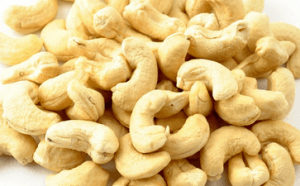Ghana government to supply cashew seedlings to farmers
 Government on Monday said it will this year freely distribute 13 million certified cashew seedlings to farmers in 96 districts.
Government on Monday said it will this year freely distribute 13 million certified cashew seedlings to farmers in 96 districts.
Mr Augustine Collins Ntim, a Deputy Minister of Local Government and Rural Development, who made the disclosure, said the distribution is under the National Tree Crop Programme dubbed “Planting for Export and Rural Development” (PERD) Programme.
He recounted that for the pilot year 2018, the programme distributed 9.3 million cashew seedlings to 64,000 farmers in 106 districts and was estimated to contribute about 53 per cent of total contribution of the non-traditional exports to the Ghanaian economy in 2018, an increase from 44 per cent in 2017.
“Despite this historic growth record, the Ghanaian cashew farmer is challenged with low productivity, due to poor agricultural practices and low returns on investments.
“Most of these farmers are also disconnected from markets, and lack access to on farm and business training,” Mr Ntim stated at the opening of Seventh Edition of the Master Training Programme on Cashew Value Chain Promotion at Peduase in the Eastern Region.
The Master Training Programme is being organised by the Competitive Cashew Initiative (GIZ/ComCashew) in partnership with the African Cashew Alliance (ACA) with support from the Ministry of Food and Agriculture (MoFA) and the Cocoa Research Institute Ghana (CRIG).
It seeks to increase theoretical knowledge and practical skills of African cashew experts along the value chain and consequently to further promote the competitiveness of African cashew.
The Programme provides a platform for 85 cashew experts coming from nine African countries: Ghana, Benin, Burkina Faso, Cameroun, Cote d’Ivoire, Mozambique, Guinea, Nigeria and Sierra Leone, to share knowledge, discuss best practices and lessons learnt as well as to build national and regional networks for future collaborations.
Mr Ntim said the Competitive Cashew Initiative made enormous contributions towards the development of the African Cashew Industry since its inception in 2009.
He said this had been done through strategic innovations like the Master Training Programme that sought to build capacities, skills and experiences of cashew value chain actors across the African continent.
He said government had the vision to develop the nation’s rural economy with the aim of reducing poverty through agricultural development programme and as a decentralised intervention, the PERD Programme was implemented through the District Centre for Agriculture, Commerce and Technology in all districts.
He said the project was one of the key strategic interventions for the “Ghana Beyond Aid” Agenda in line with government’s coordinated Programme of Economic and Social Development Policies and the PERD programme, would be launched by President Nana Addo Dankwa Akufo-Addo on April 24 this year.
It is a decentralised National Tree Crop Programme to promote rural economic growth and improve household incomes of rural farmers through the provision of certified improved seedlings, extension services, business support and regulatory mechanisms focusing on cashew, coffee, cotton, coconut, citrus, oil palm, mango, rubber and shea value chains.
It also aims at creating jobs and producing a sustainable raw materials base towards the Government’s industrialisation drive, through the One District, One Factory (1D1F) initiative.
He said the PERD programme would also engage some 10,000 young graduates as crop specialised extension officers.
“The inclusion of cashew in the programme seeks not only to alleviate poverty, but to also address issues of climate change and livelihood adaptation strategies, which seeks to position Ghana as a world leading producer of cashew within the next five to ten years,” Mr Ntim said.
Mr Seth Akoto, the Director, Crop Services, MoFA said through collaboration and joint efforts, Africa countries could succeed in strengthening the growth of the cashew sector on the continent.
Madam Dorcas Amoh, Food Safety and Technical Assistance Manager, African Cashew Alliance, said across the continent, many products of the Masters Training Programme could be found in key segments of the cashew sector.
Madam Mary Adzanyo, Director, Private Sector Development, GIZ/Competitive Cashew Initiative said the impact of the training programme, though subtle, could be seen in the tremendous growth and attention being given to the sector by governments on the continent.
Source: GNA
